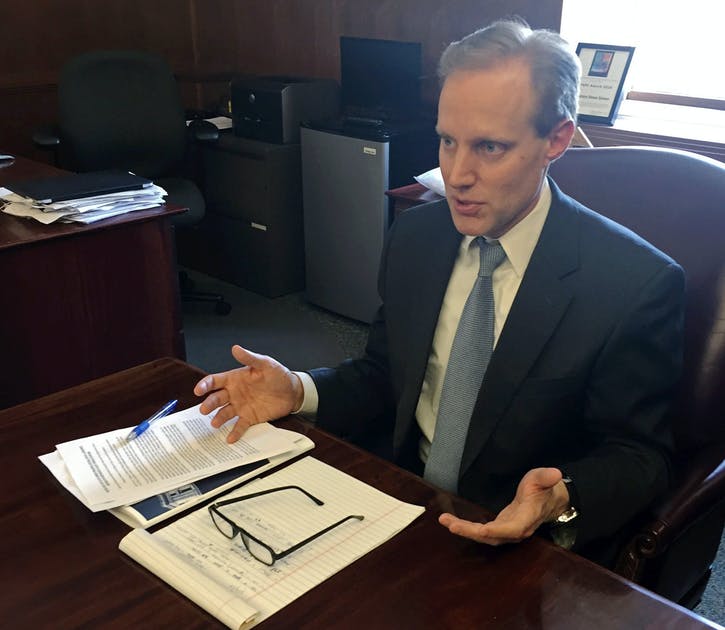Election fraud claims ‘foolish and irresponsible,’ says Minnesota secretary of state

Minnesota Secretary of State Steve Simon warned one of his predecessors this week to stop spreading misinformation about the 2020 elections, blistering claims that fraud swung the outcome as “foolish and irresponsible.”
State Sen. Mary Kiffmeyer, the Big Lake Republican who chairs the Senate’s elections committee, had pressed him for details last month on the August primary and November general election as she cited “anecdotal reports of irregular election activity, questions on software, equipment malfunctions and other concerns during this year’s election.”
In a letter late Tuesday to Kiffmeyer, Simon, a Democrat, repeated his assessment that the Nov. 3 vote was free from fraud. Echoing state and federal officials’ conclusions, Simon described the election as a “tremendous success” that required an “unprecedented effort” from officials across all levels of government to administer the vote amid the COVID-19 pandemic.
Kiffmeyer, a frequent Simon critic who served as secretary of state from 2003-07, had singled out Dominion Voting Systems, which has been the subject of unfounded claims by President Donald Trump and his supporters that the company was enmeshed in a vast conspiracy to change votes cast for Trump to ones for President-elect Joe Biden.
Dominion has cleared state and federal certification requirements and has been authorized for use in Minnesota, Simon told Kiffmeyer on Tuesday. He added that Aitkin, Crow Wing, Dakota, Mahnomen, Scott and Sherburne Counties use Dominion equipment. All but one of those counties — Dakota — went for Trump in the 2020 election.
There is “no credible evidence,” Simon wrote, that votes were manipulated or otherwise compromised anywhere in the state last month.
“Anyone claiming otherwise is insulting the tireless work of election administrators across the state,” Simon wrote. “Foolish and irresponsible claims are unworthy of attention. Nevertheless, if my answers to your questions can in any way help stop this spread of misinformation, I am happy to be helpful.”
Kiffmeyer was not immediately available for comment on Simon’s letter. The two have maintained a prickly relationship that was aggravated by a protracted and bitter debate over freeing up federal election security money that had been OK’d by Congress in 2018.
New court challenges
A series of court challenges to Minnesota’s election results persist while similar efforts filed by Republicans around the country continue to sputter.
Hours before Minnesota’s canvassing board signed off on the state’s election results last week, a group of GOP state lawmakers and unsuccessful Republican candidates petitioned the Minnesota Supreme Court to stop the process. The group raised a broad array of claims that included references to vote count anomalies and suggestions that voting machines could have been tampered with. The group asked for a “bipartisan statewide audit of the 2020 general election.”
A summer settlement agreement to extend the absentee mail ballot counting deadline by one week and waive the witness signature requirement for absentee ballots has been a consistent target of Minnesota Republicans who are questioning the election’s validity.
An assistant attorney general representing Simon’s office argued this week that the Supreme Court petition is moot because the election results have already been certified, and added that the petitioners waited an unreasonable amount of time before making their claims. Assistant Attorney General Nathan Hartshorn also argued that Simon’s consent decree had already survived a prior state court challenge.
The Supreme Court has not rendered a final decision on the case. Meanwhile, at least two more challenges to the election have been filed in Clay and Dakota counties.
The Dakota County case was filed by many of the same candidates who petitioned the Supreme Court last month, including unsuccessful GOP congressional candidate Tyler Kistner. The group is alleging “irregularities” in the state’s general election and canvassing of absentee ballot votes. Like the Supreme Court petition, they claim the extension of the absentee ballot counting deadline and waiving of its witness requirement this year illegally circumvented the Legislature.
The Dakota County challenge repeats allegations of tampering with Dominion voting machines, without providing evidence, and claims “many examples of similar vote count anomalies in Minnesota as well as issues with systems being down or experiencing unexplained so-called ‘glitches’ during the night allowing for the alteration of vote counts.”
“There should never be excuses made for inconsistent, nontransparent, nonsecure and sloppy administration of elections,” wrote Jane Volz, an attorney for the Republican challengers. “This year, with such clear stakes, the consequences for mismanagement must be dire.”
A similar election contest filed in Clay County also claims “abnormal trends in election data” — something Minnesota GOP Party Chairwoman Jennifer Carnahan raised last month in a statement casting doubt on the election.
During last month’s state canvassing board meeting, Elections Director David Maeda reported that randomized postelection audits carried out in all 87 counties did not show a level of irregularities that would have, by law, triggered a full recount in any county. Maeda added that no county has had to perform a recount based on a high rate of irregularities since the state began that form of postelection testing in 2006.
A spokeswoman for the Minnesota Senate’s GOP caucus said Wednesday that Kiffmeyer is planning to lead a hearing on the state’s election results next week.
Nearly 3.3 million Minnesotans voted in last month’s general election, approaching an 80% turnout rate that led the nation. A record 58% of votes were cast via absentee — up from 24% in 2018 — following a push by state officials for voters to send in their ballots early to avoid crowding polling places as the pandemic raged.
In his response to Kiffmeyer Tuesday, Simon inserted a reference to her testimony before Congress when she served in the role he now holds. At the time, Kiffmeyer attributed Minnesota’s historically high rate of voter turnout to demands from voters that “elections meet the highest standards of accuracy, access, integrity, and privacy.”
“Your formulation was correct,” Simon wrote this week. “High turnout is a strong indicator of confidence in many other portions of the election system. With a first-in-the nation voter participation rate in 2020, I am happy to report that Minnesotans remain as confident as ever in the integrity and accuracy of our election system.”
Twitter: @smontemayor
*** This article has been archived for your research. The original version from Minneapolis Star Tribune can be found here ***


